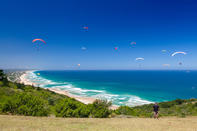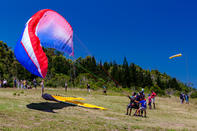History
In 1964, the American came up with the revolutionary rectangular parafoil, employing sectioned cells inflated via an open leading edge.

The concept of ‘slope soaring’ was simultaneously explored, but paragliding as we know it today can be traced back to three gutsy French adventurers in 1978. They harnessed on square parafoils and legged it down the slopes of Point du Pertuiset, and the French term 'parapente' was born as they took flight.
Start off Small

You don’t need to be a superhero to experience the ecstasy of free flight, and all you need to take to the skies are some athletic ability and the guts to run off big cliffs. If you’re keen to get into the flying game, the obvious first step would be a tandem flight with a reputable instructor registered with SAHPA.
A number of countrywide institutions offer training courses lasting around three months, and once you’ve ascertained that the thrill of flying is your thing, this is your obvious next step.
Start off by learning how to control the canopy with your feet planted firmly on the ground, and then step up to a safe sand dune to do your best Wright Brothers impression! You will need in the region of fifty flights while in radio contact with an instructor, and will only then be allowed to apply for their basic license.
At some stage during the proceedings, you will need to sit down with your bank manager to discuss money matters. Although paragliding is not a cheap sport, you should be able to kit yourself out. Used equipment may save you a substantial amount, but it is imperative to get an experienced paraglider to inspect your purchase to make 100% sure it is airworthy.
Your wing will comprise the bulk of your budget, but the harness and a good quality, full-face flying helmet is just as important. Add a flight suit, sturdy footwear, a variometer, GPS and a communications system to your shopping list, and your bank balance will certainly know about it.